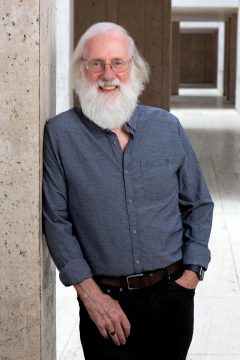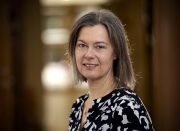
RESEARCH SEMINAR. On Thursday, May 16, our lecture series Sahlgrenska Science Seminar Series will be honoured with a talk by a prominent cancer researcher: Tony Hunter, professor at the Salk Institute for Biological Studies in San Diego. He will give a presentation entitled “A journey from tyrosine to histidine phosphorylation: uncovering new cancer mechanisms” at 13:00 in the Arvid Carlsson auditorium, Medicinaregatan 3. The lecture can also be followed live via Zoom. Welcome!

Professor Ruth Palmer is very much looking forward to Tony Hunter’s lecture:
“He is a giant in his field and has won many international awards in cancer research. He has never been to Gothenburg before. After he has been here, he will hold a second seminar in Uppsala, where I know the hall will be full! Let’s make sure to fill the hall here in Gothenburg too!”
Professor Tony Hunter’s visit has been made possible thanks to the generosity of the Wenner-Gren Foundation and is the 2024 Wenner-Gren Foundation’s Distinguished Lecturer.
TOPIC

Tony Hunter: A journey from tyrosine to histidine phosphorylation: uncovering new cancer mechanisms
TIME – Thursday May 16th, 13:00-14:00
VENUE – Lecture Hall Arvid Carlsson, Medicinaregatan 3, or via Zoom: https://gu-se.zoom.us/j/69427221961
Professor Tony Hunter’s lab at the Salk Institute for Biological Studies in San Diego has made many seminal scientific contributions, including in the areas of tyrosine phosphorylation, cell cycle regulation, phosphodependent Prolyl Isomerases, RING Domain E3 Ubiquitin Ligases and studies of the “kinome”. He has an extensive track record in investigating signaling pathways initiated by receptor tyrosine kinases and discovered tyrosine phosphorylation as a new principle of protein regulation, showing that aberrant tyrosine phosphorylation is a major mechanism of oncogenic transformation. This discovery subsequently led to development of a new class of cancer drug, known as TKIs, directed against oncogenically activated tyrosine kinases. TKIs are widely used for targeted cancer therapy, and, currently, >80 TKIs are approved for clinical use. For many years, his laboratory has studied the roles of phosphorylation and other posttranslational modifications in cell proliferation, the DNA damage response, and cancer, and analysed phosphorylation, ubiquitylation, and sumoylation-based cellular signaling pathways in normal and cancer cells. In particular, he has studied the role of protein kinases and tyrosine/serine/threonine phosphorylation events in the responses of normal cells to stimulatory signals and investigated how cancer cells rewire their phosphorylation networks to proliferate and survive.
In his more recent work, the Hunter lab has focused on the role of cellular crosstalk between stromal cells and tumor cells in the tumor microenvironment (TME) in pancreatic adenocarcinoma (PDA), and, in particular, the contributions of pancreatic cancer stromal cells, known as cancer-associated fibroblasts (CAFs), in PDA progression. His goal has been to identify paracrine factors secreted by activated CAFs in the tumor tissue that act on the tumor cells and can be targeted for therapeutic purposes. These studies identified the LIF (leukemia inhibitory factor) cytokine, secreted by activated CAFs, that acts on tumor cells to promote survival and maintain stemness, thereby serving as a driver of PDA progression. Moreover, therapeutic targeting of LIF by a neutralizing anti-LIF monoclonal antibody in a mouse model of PDA prolongs survival and increases sensitivity to chemotherapy, implicating LIF signaling as a therapeutic resistance mechanism. LIF levels are high in human PDA tissue, with high LIF levels correlating with disease progression. Serum LIF levels are also elevated in PDA patients and correlate with disease stage, suggesting that LIF could be a useful PDA biomarker, as well as a target for combination PDA therapy.
Most recently, he has studied phosphorylation of histidine in proteins, an understudied posttranslational modification, using 1-pTza and 3-pTza phosphohistidine (pHis) analogue-containing peptides to generate a collection of monoclonal antibodies (mAbs) that are selective for either the 1-pHis or 3-pHis isoform of pHis. These mAbs were used to investigate a possible role for histidine phosphorylation in cancer, showing that elevated histidine phosphorylation is a potential driver of hepatocellular carcinoma and pediatric neuroblastoma. In ongoing work, his group is investigating a role for histidine phosphorylation in triple negative breast cancer and pancreatic cancer, and in particular its possible role in the formation and function of invadopodia structures in neuroblastoma cell invasiveness.
In addition to his ongoing research activities, Tony Hunter has served on numerous Scientific Advisory and Editorial Boards and is frequently invited to give Keynote lectures at international conferences. He is also the recipient of numerous prestigious prizes, including the 2022 AACR Lifetime Achievement Award in Cancer Research, the 2018 Tang Prize for Biopharmaceutical Science, the 2018 Pezcoller Foundation-AACR International Award for Cancer Research, the 2017 Sjöberg Prize in Cancer Research, the 2014 Royal Medal, Royal Society of London, the 2005 Wolf Prize in Medicine and the 2004 American Cancer Society Medal of Honor.











Leave a Comment